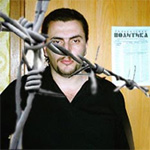On November, 20th, the Moscow Butyrsky court sentenced newspaper Editor in Chief Boris Stomakhin to five years´ imprisonment for incitement ethnic hatred and making extremist statements. Human rights activists are concerned about sentencing the fearless journalist, who has been criticizing actions of Russian authorities in the Chechen Republic. (02-DEC-06)
Text: HRH/Moscow, by Yanina Savenko. Sources: cjes.ru, rian.ru, demos-center.ru, lenta.ru, svobodanews.ru
Boris Stomakhin was editor of monthly newspaper “Radikalnaya Politika”. Besides, he regularly contributed materials to the Kavkaz Center website, the Islamic Internet agency covering events in the Chechen Republic and promoting Chechen independence. He called presence of Russian troops in the Chechen Republic ´occupation´ and compared President Vladimir Putin with Saddam Hussein and Slobodan Miloscevic.
Persecution started in 2003
At first Stomakhin was accused of inciting hatred by his articles in Radikalnaya Politika in 2003, concerning the  Chechen conflict. A suit was filed against him in December 2003. His home was raided in April 2004 and his property, including computers and books, were confiscated. Stomakhin was interrogated in April 2004. Prosecutors planned to declare Stomakhin mentally ill and irresponsible and wanted to send him for involuntary treatment in a psychiatric hospital. However, the Russian Research Center for Human Rights prevented such actions. Specialists from the Independent Psychiatric Association of the Russian Federation conducted a psychiatric-psychological evaluation and made conclusion that Stomakhin could understand the meaning of his actions and control them and that he didn’t need forensic psychiatric evaluation. Later Stomakhin fled to the Ukraine seeking political asylum, which was not granted. Having returned to Moscow, he was arrested on 21 March 2006, following his attempt to escape by jumping from the fourth floor of a building. After the incident he became disabled the person and his spinal cord was seriously injured.
Chechen conflict. A suit was filed against him in December 2003. His home was raided in April 2004 and his property, including computers and books, were confiscated. Stomakhin was interrogated in April 2004. Prosecutors planned to declare Stomakhin mentally ill and irresponsible and wanted to send him for involuntary treatment in a psychiatric hospital. However, the Russian Research Center for Human Rights prevented such actions. Specialists from the Independent Psychiatric Association of the Russian Federation conducted a psychiatric-psychological evaluation and made conclusion that Stomakhin could understand the meaning of his actions and control them and that he didn’t need forensic psychiatric evaluation. Later Stomakhin fled to the Ukraine seeking political asylum, which was not granted. Having returned to Moscow, he was arrested on 21 March 2006, following his attempt to escape by jumping from the fourth floor of a building. After the incident he became disabled the person and his spinal cord was seriously injured.
Intimidation of journalists and human rights activists
Prosecutors said that Stomakhin´s reports “provoked criminals and terrorists, whose actions are aimed at destroying the Russian people as nation.” The public prosecutor had even called for the seven-year prison term for Stomakhin. But Stomakhin, who has been in custody since March 2006, doesn’t plead guilty and is going to appeal against the ruling. Meanwhile human rights activists do not believe that Stomakhin´s works can be interpreted as incitement ethnic hatred. Moreover, the case will further undermine freedom of the press in the Russian Federation. This case has implications for the entire journalistic community, and it is a clear warning to those in the journalistic community who do not follow the official line, particularly in regard to the Chechen Republic.
Absurd accusation
“A great tragedy happened to the Russian Federation. Unlucky fate of Stomakhin marked new epoch in the  field of justice, when judicial authorities are not ashamed of putting a disabled person on the dock. They brought him on stretchers and laid down on the dock with utter coolness and sometimes he was going upstairs to the fifth floor on crutches. From the juridical point of view Stomakhin couldn’t be charged under the Article 282 of the Russian Federation Criminal Code (Incitement of race, ethnical and religious hatred) at all, because he isn’t a representative of an ethnical minority which could be condemned for russophobia. Boris Stomakhin is Russian. And it turns out that he has been inciting ethnic hatred against himself”, said Valeria Novodvorskaya, Chairwoman of the “Democratic Union” party. Svetlana Gannushkina, Chairwoman of “Civil Assistance” Committee believes that articles by Stomakhin were aggressive, but they couldn’t prompt anyone to violence in the Russian Federation. «Whom were Stomakhin’s words addressed to? To Shamil Basaev and other members of illegal gangs. Could they incite them to actions that couldn’t have happened without Stomakhin? Certainly, couldn’t».
field of justice, when judicial authorities are not ashamed of putting a disabled person on the dock. They brought him on stretchers and laid down on the dock with utter coolness and sometimes he was going upstairs to the fifth floor on crutches. From the juridical point of view Stomakhin couldn’t be charged under the Article 282 of the Russian Federation Criminal Code (Incitement of race, ethnical and religious hatred) at all, because he isn’t a representative of an ethnical minority which could be condemned for russophobia. Boris Stomakhin is Russian. And it turns out that he has been inciting ethnic hatred against himself”, said Valeria Novodvorskaya, Chairwoman of the “Democratic Union” party. Svetlana Gannushkina, Chairwoman of “Civil Assistance” Committee believes that articles by Stomakhin were aggressive, but they couldn’t prompt anyone to violence in the Russian Federation. «Whom were Stomakhin’s words addressed to? To Shamil Basaev and other members of illegal gangs. Could they incite them to actions that couldn’t have happened without Stomakhin? Certainly, couldn’t».
Pseudo-fight against extremism
Many public personalities, journalists and human rights activists share opinion that Stomakhin isn’t an extremist, but rather the victim of political regime which has been inventing laws forbidding any actions and words against authorities. According to Liubov Vinorgadova, Director of the Russian Research Center for Human Rights, Stomakhin’s case is typical and reflected authorities’ unwillingness truly to fight against ethnical hatred and xenophobia. “In spite of pursuing policy of social-economic reforms and gradually calling off federal troops from the Chechen Republic, they send to prison rather inoffensive people whose even radical statements couldn’t influence development of the conflict in the Chechen Republic.


